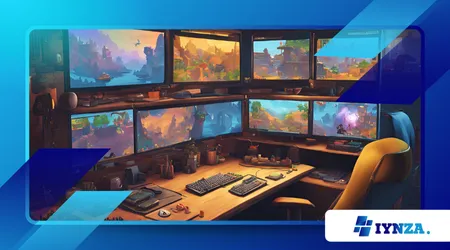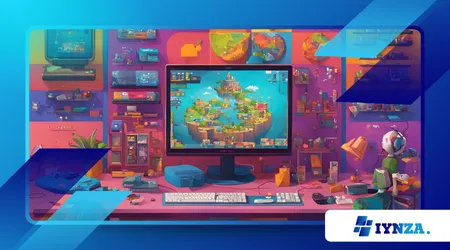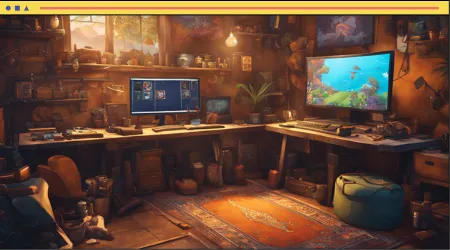The Art of Modding: How to Customize Your Gaming Experience

In the ever-evolving world of gaming, the art of modding has become a cornerstone of creativity, allowing players to reshape their virtual worlds.
Anúncios
From enhancing graphics to creating entirely new gameplay mechanics, modding has transformed how we interact with games.
It’s no longer just about playing; it’s about creating, sharing, and experiencing games in ways developers never imagined.
As we step into 2025, the modding scene is more vibrant than ever, driven by cutting-edge tools, passionate communities, and a culture that celebrates innovation.
What is Modding?
Modding, short for “modification,” refers to the process of altering or expanding a game’s content.
This can range from simple tweaks, like changing character skins, to complex overhauls that introduce new storylines, mechanics, or even entire worlds.
The beauty of modding lies in its accessibility. With tools like Blender, Unity, and Unreal Engine 5, even beginners can dive into game customization.
For instance, a player might use these tools to redesign a game’s environment, adding lush forests or futuristic cities that weren’t part of the original design.
Moreover, modding isn’t limited to visuals. Players can modify gameplay mechanics, such as adjusting difficulty levels, adding new weapons, or even creating entirely new game modes.
This flexibility ensures that no two gaming experiences are ever the same.
+ Women in Sports: Breaking Barriers and Shaping the Industry
Why Modding Matters

Modding isn’t just about customization; it’s about community. Platforms like Nexus Mods and Steam Workshop host millions of user-generated mods, fostering collaboration and innovation.
These platforms serve as hubs where creators can share their work, receive feedback, and inspire others to build upon their ideas.
For example, the Skyrim modding community has created everything from high-resolution texture packs to fully voiced NPCs, extending the game’s lifespan far beyond its initial release.
This collaborative spirit has turned modding into a global phenomenon, with creators from all corners of the world contributing to a shared library of content.
Beyond creativity, modding also democratizes game development. Aspiring developers can use modding as a stepping stone, honing their skills and building portfolios that showcase their talent.
Many professional game designers today started their careers as modders, proving that the art of modding is more than just a hobby—it’s a pathway to innovation.
Also Read:How are indie games pushing the boundaries of storytelling and gameplay?
The Evolution of Modding
In 2025, modding has reached new heights. Advanced tools like Unreal Engine 5 and AI-driven mod assistants have made the process more accessible than ever.
These tools streamline tasks like 3D modeling, texture creation, and coding, allowing even novice modders to produce professional-quality content.
For instance, AI-powered tools can now generate realistic textures or suggest optimizations for mod performance, reducing the technical barriers that once intimidated newcomers.
This democratization of modding has led to an explosion of creativity, with mods becoming more sophisticated and diverse.
The rise of cloud-based modding platforms has also changed the game. These platforms allow modders to collaborate in real-time, regardless of their location.
Imagine a team of modders from different continents working together to create a massive expansion for Cyberpunk 2077, seamlessly integrating their contributions into a single, cohesive project.
| Year | Modding Milestones |
|---|---|
| 2000 | First major game mods (e.g., Counter-Strike) |
| 2010 | Rise of modding communities (e.g., Skyrim) |
| 2025 | AI-powered modding tools dominate |
How to Start Modding
- Choose Your Game: Popular titles like The Elder Scrolls V: Skyrim, Minecraft, and Grand Theft Auto V are modding goldmines. These games have robust modding communities and extensive documentation, making them ideal for beginners.
- Learn the Tools: Familiarize yourself with software like Blender, Unity, or Unreal Engine 5. Many of these tools offer free versions and extensive tutorials, making it easy to get started.
- Join Communities: Engage with forums, Discord groups, and social media communities dedicated to modding. These spaces are invaluable for learning, troubleshooting, and finding inspiration.
For example, a beginner might start by downloading a simple mod manager like Vortex for Skyrim.
From there, they can experiment with installing mods, learning how different files interact, and eventually creating their own modifications.
+ Nostalgia Alert: Why Retro Games Are coming back in 2025
The Impact of Modding on Gaming Culture

Modding has transformed gaming from a passive experience to an interactive art form. It’s a testament to the power of player-driven creativity, where the line between player and developer blurs.
One of the most significant impacts of modding is its ability to extend a game’s lifespan.
Games like The Witcher 3 and Fallout 4 continue to thrive years after their release, thanks to the dedication of modding communities.
These mods not only fix bugs but also introduce new content, keeping the games fresh and engaging.
Moreover, modding has given rise to entirely new genres. For instance, the battle royale genre, popularized by games like Fortnite, traces its roots back to mods for ARMA 2.
This demonstrates how modding can influence the broader gaming industry, driving innovation and shaping trends.
| Game | Number of Mods (2025) |
|---|---|
| Skyrim | 75,000+ |
| Minecraft | 100,000+ |
| GTA V | 50,000+ |
Challenges in Modding
Despite its appeal, modding isn’t without hurdles. Legal issues, compatibility problems, and the steep learning curve can deter newcomers.
For example, some developers are wary of modding due to concerns about intellectual property and monetization.
While many studios embrace modding, others impose restrictions, creating a fragmented landscape for modders.
Compatibility is another common challenge. With thousands of mods available, ensuring that they work together seamlessly can be a daunting task.
Tools like LOOT (Load Order Optimization Tool) help mitigate these issues, but they require a deep understanding of how mods interact.
Finally, the technical complexity of modding can be intimidating. While AI-powered tools have made the process more accessible, creating high-quality mods still requires time, patience, and a willingness to learn.
The Future of Modding
With the rise of VR and AR, modding is set to revolutionize immersive experiences. Imagine customizing entire virtual worlds with a few clicks, creating environments that feel truly personal.
In 2025, modding is increasingly integrated into game development pipelines.
Studios are releasing official modding tools alongside their games, encouraging players to experiment and share their creations.
This symbiotic relationship between developers and modders is reshaping the industry, fostering a culture of collaboration and innovation.
Moreover, the advent of blockchain technology has introduced new possibilities for modding.
Decentralized platforms allow modders to monetize their work securely, ensuring that their contributions are fairly compensated.
This could lead to a new era of professional modding, where creators can turn their passion into a sustainable career.
The Role of AI in Modding
Artificial intelligence is playing an increasingly important role in modding. AI-powered tools can now generate realistic textures, optimize performance, and even suggest creative ideas for mods.
For example, an AI tool might analyze a game’s environment and suggest enhancements, such as adding dynamic weather effects or improving lighting.
These tools not only save time but also inspire modders to push the boundaries of what’s possible.
Additionally, AI is being used to streamline the modding process. Tools like ChatGPT-5 can assist with coding, troubleshooting, and even writing dialogue for custom NPCs.
This integration of AI into modding workflows is making the process more accessible and efficient.
Conclusion
The art of modding is more than a hobby; it’s a movement. By embracing modding, gamers can unlock limitless possibilities and redefine their gaming experiences.
Whether you’re a seasoned developer or a curious beginner, the world of modding offers something for everyone.
As we look to the future, the potential for modding is boundless.
From VR and AR to AI and blockchain, new technologies are opening doors to unprecedented levels of creativity. This is the future of gaming—crafted by you.
Frequently Asked Questions
1. What is the best game to start modding?
Games like Skyrim, Minecraft, and GTA V are ideal for beginners due to their active modding communities and extensive resources.
2. Do I need coding skills to mod?
Not necessarily. While coding can be helpful, many modding tools and platforms are designed for users with little to no programming experience.
3. Are mods legal?
In most cases, yes. However, it’s important to respect the terms of service of the game and avoid using mods for cheating or piracy.
4. Can I monetize my mods?
Some platforms allow modders to monetize their work, but this often requires approval from the game’s developer. Blockchain-based platforms are also emerging as a way to monetize mods securely.
5. How do I ensure my mods are compatible with others?
Using tools like LOOT and testing your mods extensively can help ensure compatibility. Joining modding communities can also provide valuable insights and support.
6. What are the risks of modding?
Modding can sometimes lead to crashes or bugs, especially if mods are incompatible. Always back up your game files before installing mods.
7. Can modding improve my career prospects?
Absolutely. Many professional game developers started as modders, using their creations to showcase their skills and build portfolios.
8. What’s the future of modding?
With advancements in AI, VR, and blockchain, the future of modding is bright. Expect more accessible tools, immersive experiences, and new ways to monetize your creations.
